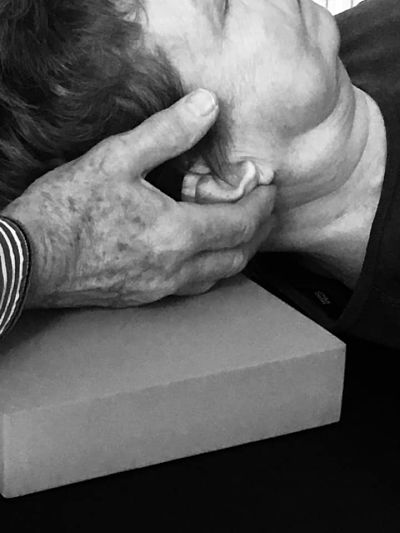 To Zoom or not to Zoom? – that is the question for Alexander teaching.
To Zoom or not to Zoom? – that is the question for Alexander teaching.
The recent easing of Covid restrictions has brought a very welcome return to in-person Alexander lessons (with appropriate Covid preventative measures of course). After 4 months of only being able to work online, it’s great to be back to hands-on teaching and training. The easier social interaction that comes with in-person work is one reason why it tends to be so much more rewarding for me than online teaching but this only one part of the story.
A couple of years ago – well before Covid struck – I wrote a blog post about why we do hands-on work in Alexander teaching. My main conclusion was that, if we want to facilitate the most effective learning possible, we really need to combine hands-on with spoken guidance equally in our teaching. Following two lockdowns with online-only work possible, I was interested to re-read this blog post to see if my views had changed about the relative importance of hands-on and other forms of guidance in teaching the Alexander Technique.
But first, a few words on my experience of online teaching and training people in the Alexander Technique. It has been a very positive experience – I’ve been surprised and impressed at just how much can be achieved through this format by way of practical learning. Feedback from both private clients and teacher trainees is that it became even more obvious to them that the Alexander Technique is about empowering them as individuals to become self-reliant. They can’t simply ‘hand over to the teacher to set them right’. People have also often commented that it’s made a big difference being in their own usual living space (rather than in the Alexander teaching room) for their lessons and how this has helped translate the Alexander Technique into their everyday reality. And, from the teacher perspective, when deprived of the usual hands-on instruction and feedback, I’ve found that we can rely on our other senses to come in to fill the void. And of course there are also the logistical benefits of online teaching – one example is being able to work again with my friend in Australia.
So my own experience is that a great deal can be achieved with teaching the Alexander Technique online. Moreover, I’ve found it’s possible to discover additional benefits to those that generally accrue from exclusively in-person teaching. There are, however, some points to bear in mind. In my own online teaching, I’ve worked almost exclusively with people who already had some experience of Alexander learning through the usual in-person combined hands-on and spoken guidance method. For an individual with no prior experience, it must be more challenging to begin learning the Alexander Technique without the benefit of hands-on guidance. At least theoretically it is, however, possible – after all, FM Alexander developed his method on his own (albeit it took him many years). Some other teachers will have more experience than I do of online teaching of absolute beginners and, like me, they’ve had ‘positive results’. I would be very interested to know what could a well-designed research study tell us about the effectiveness of online versus in-person teaching?
 In this regard, one should mention that the research evidence base for the effectiveness of Alexander teaching all rests on combined hands-on and verbal guidance provided through one-to-one in-person lessons by STAT-registered teachers (see research on: back pain, neck pain, Parkinson’s). Yes, we should continue to explore the benefits of online teaching but, to do this in any meaningful way, we need reliable research to guide us. Relatedly, we need to be clear about what type of Alexander teaching we’re talking about when making any claims about potential benefits (online / in person, one-to-one / group, equal hands-on and spoken guidance / predominantly one or other etc).
In this regard, one should mention that the research evidence base for the effectiveness of Alexander teaching all rests on combined hands-on and verbal guidance provided through one-to-one in-person lessons by STAT-registered teachers (see research on: back pain, neck pain, Parkinson’s). Yes, we should continue to explore the benefits of online teaching but, to do this in any meaningful way, we need reliable research to guide us. Relatedly, we need to be clear about what type of Alexander teaching we’re talking about when making any claims about potential benefits (online / in person, one-to-one / group, equal hands-on and spoken guidance / predominantly one or other etc).
So, coming back to my previous blog post, my conclusion has not changed. On the basis of everything we know at present, my advice would be that, if you want to find the most effective way of learning the Alexander Technique, go to a STAT-registered teacher who combines hands-on and spoken guidance and who tailors their teaching to your individual needs and interests.
When hands-on work was not possible due to Covid, it was amazing to have the option of delivering online teaching and training in the Alexander Technique, and I found this experience to be enlightening and fulfilling. What interests me now in my return to in-person work, is what will I bring with me from my online experience?

